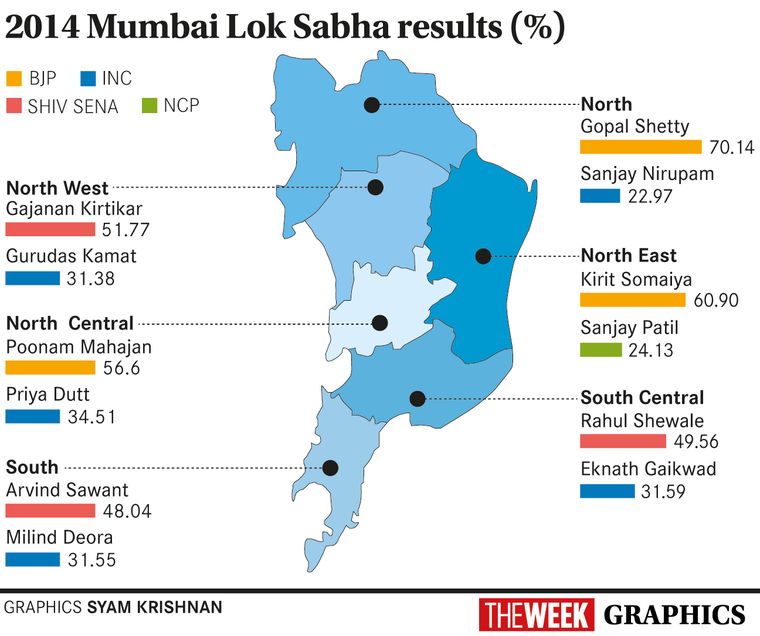WHEN MUKESH AMBANI and Uday Kotak endorsed Mumbai Congress president Milind Deora’s candidature from Mumbai South, it was an unprecedented achievement in Indian politics. Never before has an industrialist of Ambani’s stature or a banking baron like Kotak publicly endorsed a politician in Maharashtra.
The effects, obviously, will be both good and bad for Deora. On the one hand, the former Union minister and two-term MP from Mumbai South will be viewed as someone who understands the problems of businessmen, industrialists and traders, while on the other, there is a risk that he could be branded as an ‘Ambani man’ and the voice of the city’s elite. But, few know the problems faced by the city’s poor like Deora does. He and his father, Murli Deora, have won from this seat six times between themselves for the Congress. Shiv Sena’s Arvind Sawant beat Deora in 2014, and the two locked horns once again this time, when all six seats in Mumbai went to the polls on April 29.
Recently appointed as president of Mumbai Congress, Deora, 42, is shouldering the responsibility with much enthusiasm. When he took over the reins, a clear message was conveyed to all the factions within the party that internal issues could be handled later; first, make party candidates win from Mumbai.
Deora’s presence at the felicitation of actress Urmila Matondkar, the latest Congress entrant, in Borivali, showed that he meant business. He spoke slowly and cogently, welcoming her to the party with a bouquet of flowers. Though there was nothing effusive in his address, his voice exuded a certain warmth in welcoming the Marathi mulgi (girl) to the party.
“He is a very young and good politician, and I have given my best wishes to him,” said former Mumbai Congress president Sanjay Nirupam. “I have also told him clearly that as Sonia Gandhi and Rahul Gandhi have made him president, he would get my full support. I wish that, under his guidance, we win all six Mumbai seats.”
Deora had been campaigning all over the city to achieve that target. He acknowledges the effect of the Modi wave in 2014, and how the Congress failed to make a mark in the Lok Sabha and Maharashtra assembly elections that year, but is optimistic this time. “Our vote share will increase, giving us electoral dividends. I am certain you will see a resurgent Congress especially now, when the Modi wave no longer exists,” he said.
Denying that the Congress in Mumbai was in disarray because of infighting, he said, “In a party like Congress, with strong democratic values, arguments or dissent cannot be construed as the party being in disarray. We set up coordination mechanisms for the smooth functioning of the party during and after the elections.”
Since Deora’s appointment as president, the conflicts seem to have reduced. During Nirupam’s term, senior leaders like Priya Dutt, Naseem Khan and Kripa Shankar Singh were not happy with the functioning of the party. Dutt was reluctant to contest elections this time, but the Congress high command intervened and convinced her to participate. Deora, on his part, made sure that Naseem Khan and Kripa Shankar Singh worked wholeheartedly for Dutt and buried their differences.
Asked whether Rahul Gandhi’s minimum income guarantee scheme is viable, Deora remains optimistic. “The Congress party does not believe in making jumlas (empty promises) and has thought through this initiative in consultation with economists and relevant experts in the field of finance and policy,” he said. “In my view, this is not a one-off decision. I remember, during UPA-I, the idea of transferring subsidies directly to the beneficiaries started and a big step towards it was Aadhaar. Minimum income guarantee scheme will fulfil the purpose of Aadhaar in the lives of marginalised Indians, bridging the gap between the rich and the poor.”
Deora plans to address the housing and infrastructure issues that plague the city. “Ensuring 500sqft housing would be a priority for all redeveloped and rehabilitated buildings,” he said, emphasising how “urban infrastructure needs to take precedence over other emotive issues”. Also, as South Mumbai has witnessed a 172 per cent rise in crimes against women in the last five years, Deora says that women’s safety would be another important issue that he hopes to address.
Deora and the Congress-NCP alliance have a lot to prove as all six seats in the metropolis were pocketed by the BJP-Shiv Sena combine in 2014. On one hand, Deora has seasoned candidates like Eknath Gaikwad, Dutt and Nirupam; on the other, there is someone like Matondkar, who has no political experience. Much rides on the shoulders of the new Mumbai Congress president.



